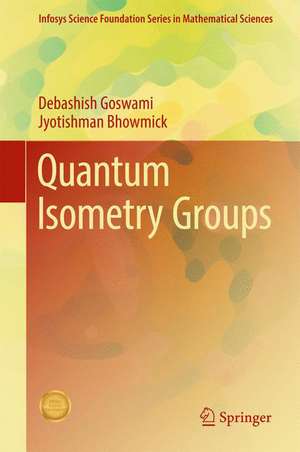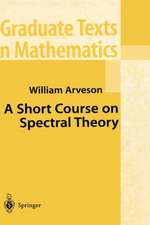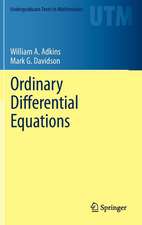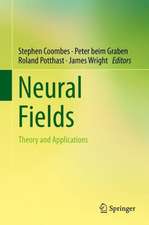Quantum Isometry Groups: Infosys Science Foundation Series
Autor Debashish Goswami, Jyotishman Bhowmicken Limba Engleză Hardback – 12 ian 2017
| Toate formatele și edițiile | Preț | Express |
|---|---|---|
| Paperback (1) | 638.76 lei 6-8 săpt. | |
| Springer India – 30 apr 2018 | 638.76 lei 6-8 săpt. | |
| Hardback (1) | 644.95 lei 6-8 săpt. | |
| Springer India – 12 ian 2017 | 644.95 lei 6-8 săpt. |
Din seria Infosys Science Foundation Series
- 15%
 Preț: 706.30 lei
Preț: 706.30 lei - 20%
 Preț: 658.33 lei
Preț: 658.33 lei -
 Preț: 377.81 lei
Preț: 377.81 lei - 20%
 Preț: 1045.25 lei
Preț: 1045.25 lei - 20%
 Preț: 653.71 lei
Preț: 653.71 lei -
 Preț: 504.28 lei
Preț: 504.28 lei - 15%
 Preț: 541.54 lei
Preț: 541.54 lei - 19%
 Preț: 470.63 lei
Preț: 470.63 lei - 15%
 Preț: 647.08 lei
Preț: 647.08 lei - 15%
 Preț: 527.48 lei
Preț: 527.48 lei - 20%
 Preț: 549.96 lei
Preț: 549.96 lei - 15%
 Preț: 711.11 lei
Preț: 711.11 lei -
 Preț: 388.52 lei
Preț: 388.52 lei - 15%
 Preț: 632.22 lei
Preț: 632.22 lei -
 Preț: 456.87 lei
Preț: 456.87 lei - 18%
 Preț: 909.81 lei
Preț: 909.81 lei - 18%
 Preț: 733.45 lei
Preț: 733.45 lei - 18%
 Preț: 886.62 lei
Preț: 886.62 lei - 24%
 Preț: 841.07 lei
Preț: 841.07 lei - 18%
 Preț: 894.79 lei
Preț: 894.79 lei - 18%
 Preț: 726.69 lei
Preț: 726.69 lei - 18%
 Preț: 784.30 lei
Preț: 784.30 lei
Preț: 644.95 lei
Preț vechi: 758.77 lei
-15% Nou
Puncte Express: 967
Preț estimativ în valută:
123.43€ • 134.02$ • 103.68£
123.43€ • 134.02$ • 103.68£
Carte tipărită la comandă
Livrare economică 22 aprilie-06 mai
Preluare comenzi: 021 569.72.76
Specificații
ISBN-13: 9788132236658
ISBN-10: 8132236653
Pagini: 235
Ilustrații: XXVIII, 235 p.
Dimensiuni: 155 x 235 x 22 mm
Greutate: 0.54 kg
Ediția:1st ed. 2016
Editura: Springer India
Colecția Springer
Seriile Infosys Science Foundation Series, Infosys Science Foundation Series in Mathematical Sciences
Locul publicării:New Delhi, India
ISBN-10: 8132236653
Pagini: 235
Ilustrații: XXVIII, 235 p.
Dimensiuni: 155 x 235 x 22 mm
Greutate: 0.54 kg
Ediția:1st ed. 2016
Editura: Springer India
Colecția Springer
Seriile Infosys Science Foundation Series, Infosys Science Foundation Series in Mathematical Sciences
Locul publicării:New Delhi, India
Cuprins
Chapter 1. Introduction.- Chapter 2. Preliminaries.- Chapter 3. Classical and Noncommutative Geometry.- Chapter 4. Definition and Existence of Quantum Isometry Groups.- Chapter 5. Quantum Isometry Groups of Classical and Quantum.- Chapter 6. Quantum Isometry Groups of Discrete Quantum Spaces.- Chapter 7. Nonexistence of Genuine Smooth CQG Actions on Classical Connected Manifolds.- Chapter 8. Deformation of Spectral Triples and Their Quantum Isometry Groups.- Chapter 9. More Examples and Computations.- Chapter 10. Spectral Triples and Quantum Isometry Groups on Group C*-Algebras.
Recenzii
“Several examples and applications are provided, including an explicit description of the quantum isometry groups of most of the noncommutative Riemannian manifolds studied in literature. Introductory sections on the basics of Riemannian geometry noncommutative geometry and quantum groups make the book enjoyable to readers with no previous expertise in the subject.” (Domenico Fiorenza, Mathematical Reviews, April 2018)
Notă biografică
DEBASHISH GOSWAMI is professor at the Stat-Math Unit of the Indian Statistical Institute, Kolkata, since 2011. Earlier, he held the positions of associate professor (2006–11) and assistant professor (2002–06) at the same department. He received his PhD degree from the Indian Statistical Institute, Kolkata, in 2000. After that, he spent couple of years in Germany and Italy for his post-doctoral research. His areas of interest include operator algebras, quantum groups, noncommutative geometry and noncommutative probability. He has published 40 research articles in several premier journals including Communications in Mathematical Physics (Springer), Advances in Mathematics (Springer), Journal of Functional Analysis, Physics Letters A, the Journal of Operator Theory, Transactions of the American Mathematical Society, Mathematische Annalen (Springer). In addition, he has published one book, Quantum Stochastic Processes and Noncommutative Geometry (Cambridge University Press).
He has received numerous awards and academic recognitions for his work, which include Shanti Swarup Bhatnagar Award (2012), J.C. Bose National Fellowship (2016), Swarnajayanthi Fellowship (2009), B.M. Birla Science Prize (2006), the INSA Medal for Young Scientists (2004), the Junior Associateship of I.C.T.P. (Italy) for 2003–07 and the Alexander von Humboldt Fellowship for 2000–01. He has been elected Fellow of the Indian Academy of Sciences (Bangalore) in the year 2015. He has visited several universities and institutes in India and abroad, including Massachusetts Institute of Technology (Cambridge), University of California (Berkeley), Max Planck Institute for Mathematics (Bonn), The Fields Institute (Canada), The Instituto Nacional de Matemática Pura e Aplicada (Brazil), University of Lancaster (England), and The Institute for Research in Fundamental Science (Iran), and delivered invited lectures at many conferences and workshops all over the world.
JYOTISHMAN BHOWMICK is assistant professor at the Stat-Math Unit of the Indian Statistical Institute, Kolkata. He obtained his PhD from the Indian Statistical Institute, Kolkata, in 2010 followed by post-doctoral positions at the Abdus Salam International Centre for Theoretical Physics, Trieste, and the University of Oslo. His research interests include noncommutative geometry and compact quantum groups. He has published several articles in several journals of repute including Communications in Mathematical Physics (Springer), Journal of Noncommutative Geometry, Journal of Functional Analysis, Transactions of the American Mathematical Society, Proceedings of the American Mathematical Society, and so on. He has received the INSA medal for Young Scientists in the year 2015. He is an associate of the Indian Academy of Sciences (Bangalore). His academic visits to foreign universities and institutes include Institut des hautes études scientifiques (Paris), The Fields Institute (Canada), University of Glasgow (Scotland), etc.
He has received numerous awards and academic recognitions for his work, which include Shanti Swarup Bhatnagar Award (2012), J.C. Bose National Fellowship (2016), Swarnajayanthi Fellowship (2009), B.M. Birla Science Prize (2006), the INSA Medal for Young Scientists (2004), the Junior Associateship of I.C.T.P. (Italy) for 2003–07 and the Alexander von Humboldt Fellowship for 2000–01. He has been elected Fellow of the Indian Academy of Sciences (Bangalore) in the year 2015. He has visited several universities and institutes in India and abroad, including Massachusetts Institute of Technology (Cambridge), University of California (Berkeley), Max Planck Institute for Mathematics (Bonn), The Fields Institute (Canada), The Instituto Nacional de Matemática Pura e Aplicada (Brazil), University of Lancaster (England), and The Institute for Research in Fundamental Science (Iran), and delivered invited lectures at many conferences and workshops all over the world.
JYOTISHMAN BHOWMICK is assistant professor at the Stat-Math Unit of the Indian Statistical Institute, Kolkata. He obtained his PhD from the Indian Statistical Institute, Kolkata, in 2010 followed by post-doctoral positions at the Abdus Salam International Centre for Theoretical Physics, Trieste, and the University of Oslo. His research interests include noncommutative geometry and compact quantum groups. He has published several articles in several journals of repute including Communications in Mathematical Physics (Springer), Journal of Noncommutative Geometry, Journal of Functional Analysis, Transactions of the American Mathematical Society, Proceedings of the American Mathematical Society, and so on. He has received the INSA medal for Young Scientists in the year 2015. He is an associate of the Indian Academy of Sciences (Bangalore). His academic visits to foreign universities and institutes include Institut des hautes études scientifiques (Paris), The Fields Institute (Canada), University of Glasgow (Scotland), etc.
Textul de pe ultima copertă
This book offers an up-to-date overview of the recently proposed theory of quantum isometry groups. Written by the founders, it is the first book to present the research on the “quantum isometry group”, highlighting the interaction of noncommutative geometry and quantum groups, which is a noncommutative generalization of the notion of group of isometry of a classical Riemannian manifold. The motivation for this generalization is the importance of isometry groups in both mathematics and physics. The framework consists of Alain Connes’ “noncommutative geometry” and the operator-algebraic theory of “quantum groups”. The authors prove the existence of quantum isometry group for noncommutative manifolds given by spectral triples under mild conditions and discuss a number of methods for computing them. One of the most striking and profound findings is the non-existence of non-classical quantum isometry groups for arbitrary classical connected compact manifolds and, by using this, the authors explicitly describe quantum isometry groups of most of the noncommutative manifolds studied in the literature. Some physical motivations and possible applications are also discussed.
Caracteristici
Presents the research on “quantum isometry group” for the first time in a book form Highlights the interaction of noncommutative geometry and quantum groups Provides an up-to-date overview and future trends of the recently proposed theory of quantum isometry groups Discusses open problems concerning the quantum isometry group and their solutions Is authored by the winner of the Shanti Swarup Bhatnagar Prize for Science and Technology Includes supplementary material: sn.pub/extras

















